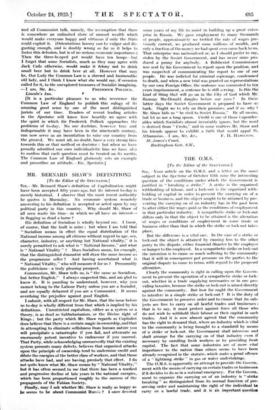THE O.M.S.
[To the Editor of the SeEeraTon.] Sin,—Your article on the O.M.S. and a letter on the same subject in the Speiator of October 17th raise the interesting question of the conditions under which the Government is justified in " breaking a strike." A strike is the organized withholding of labour, and a lock-out is the organized with- holding of capital in order to prevent the carrying on of a trade or business, and the object sought to be attained by pre- venting the carrying on of an industry has in the past been to alter either the wages paid or the conditions of employment in that particular industry. A sympathetic strike or lock-out differs only in that the object to be attained is the alteration of wages or conditions of employment in some trade or business other than that in which the strike or lock-out takes place.
But the difference is a vital one. In the case of a strike or. lock-out the object is attained by causing loss to the other party to the dispute, either financial disaster to the employer or hunger to the employed. In a sympathetic strike or lock-out the intention is to cause so much suffering to the community that it will in consequence put pressure on the parties to the original dispute to come to terms with regard to the proposed alteration.
Clearly the community is right in calling upon the Govern- ment to prevent the operation of a sympathetic strike or lock- out, whether in a trade supplying necessaries or in one pro- viding luxuries, because the strike or lock-out is aimed directly against the community. But how far ought the Government to interfere in a simple strike or lock-out ? It is the duty of the Government to preserve order and to ensure that its sub- jects are free to carry on all lawful trades and businesses that is to say, it must protect against force all those who do not wish to withhold their labour or their capital in such trades. And it is now almost agreed that the community has the right to demand that, where an industry which is vital to the community is being brought to a standstill by means of a strike or lock-out, the Government shall intervene and shall arrange for the carrying on of that industry even if necessary by enrolling fresh workers or by providing fresh capital. The fact that some industries are of more vital importance to the nation than others seems to have been already recognized in the statutes which make a penal offence of a lightning strike in gas or water undertakings. The O.M.S. is apparently an attempt to provide the Govern- ment with the means of carrying on certain trades or businessek if it decides to do so in a national emergency. For the Govern. ment to organize the carrying on of an industry is " strike breaking" as distinguished from its normal function of pre- serving order and maintaining the right of the individual to carry on a lawful trade, and it is an important question
to decide within what limits the Government should interfere to break a strike or lock-out.
I venture to suggest that they are to be found in two con- ditions : either that the strike or lock-out is sympathetic or that the strike or lock-out occurs in an industry which is vital to the health of the community. To " break a strike " in an industry the cessation of which affects not the health but only the general prosperity of the community, though perhaps logical, would open the door to Government interference in trade too widely for our present state of society, although it seems that it would be essential in a society in which indus- tries were nationalized, because a strike or lock-out in such a case would be a direct attack on the community.—I am,































































 Previous page
Previous page